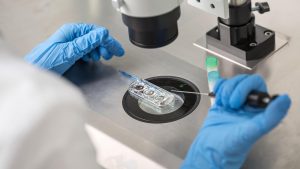A sperm cell is the male sex cell which consists of a head, midpiece and tail and like the egg from the female, carries a total of 23 chromosomes.
The head makes up about 10% of the entire sperm cell, however, it is the most important part of the sperm as it contains the genetic material required to form a whole new organism. It should be a nice oval shape attached to a midpiece and a long, uncoiled tail. The midpiece of the sperm contains mitochondria, little powerhouse cells which basically provide the energy needed to swim effectively towards the egg. To swim towards the egg, the sperm needs a long, thin tail to help the sperm swim and propel the cell towards the egg.
Sperm morphology is an important factor in determining your fertility, the shape and size of the sperm impacting the sperm’s ability to not only physically swim to the egg, but also to fertilise an egg and produce a healthy embryo.
You can find out more about sperm and fertility testing, along with male fertility here at Fertility First.

Is there anything you can do to help improve the quality of your sperm?
Believe it or not, there are a number of nutrients that have been scientifically proven to help improve the quality of your sperm.
1. Zinc
Zinc has not only been shown to help boost your sperm count, but it has also shown to improve the quality too. Zinc has powerful antioxidant properties that help to keep the sperm healthy by protecting against reactive oxygen species (ROS), which have been known to damage sperm.
ROS can be caused by smoking, chemicals, pesticides and extreme heat and has been linked to idiopathic male infertility. Foods that have been known to be excellent sources of zinc are oysters, red meat, shellfish, dairy, nuts and beans and whole wheat grain products.
2. Folate
Folate is not just only suggested for pregnant women; low levels have been associated with poor DNA stability in sperm and male reproductive function. Foods rich in folate are green leafy vegetables, fruit such as oranges, nuts, beans, whole grains and enriched flour products such as pasta and breads.
3. Vitamin D
Fertility First has recognised the importance of vitamin D levels in both our female and our male patients for over 10 years, and routine testing is carried out as part of our preliminary assessment when patients begin their fertility journey. Recent studies have supported this and shown there is a strong link between low vitamin D levels in male patients and poor sperm morphology.
Foods such as mushrooms, oily fish such as salmon and tuna, cheese, egg yolks and fortified milk and yoghurt are just a few of the ways you can increase your vitamin D intake. Vitamin D is also available in supplements and you can also boost your vitamin D intake by spending approximately 10-15 in the sun – note that sensible sun protection does not put people at risk of vitamin D deficiency.
4. Vitamin B12
There have been numerous studies that have shown the vitamin B12 has a beneficial effect on sperm quality, reducing the levels of oxidative damage to sperm. Furthermore, it has previously been revealed that infertile men have lower plasma vitamin B12 concentrations. Rich sources of vitamin B12 are found in fish and seafood, meat and poultry, dairy products and cereals.
5. Vitamin C
There are so many benefits of vitamin C. It’s a vitamin necessary for growth and repair of various body tissues, provides valuable support for your immune system, an effective antioxidant and assists with the absorption of iron. In addition to this, increasing your vitamin C intake has been linked to an improvement in sperm morphology.
The antioxidant properties can help to reduce the amount of DNA damage in sperm and significantly improve sperm morphology which will result in improved fertilisation rates and embryo quality. Furthermore, studies involving smokers, who have a substantially higher degree of sperm DNA fragmentation, showed remarkable improvement in sperm quality when increasing the amount of ascorbic acid.
Interested in learning more about improving sperm quality? Visit our guide to the most common causes of male infertility for more information.






